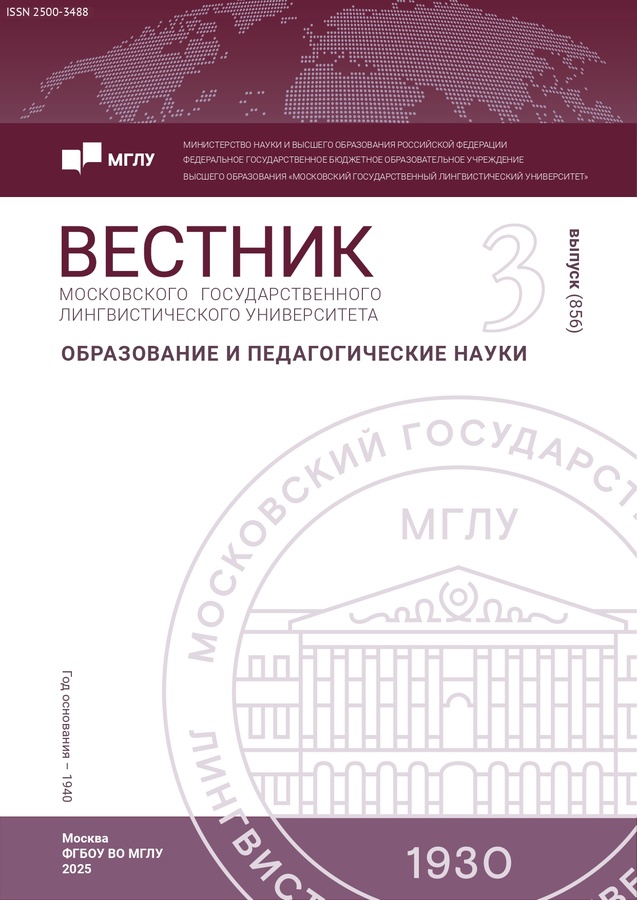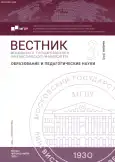Технология обучения межкультурному взаимодействию в команде студентов-регионоведов
- Авторы: Рыблова А.Н.1, Нямдорж Х.1
-
Учреждения:
- Московский государственный лингвистический университет
- Выпуск: № 3 (848) (2023)
- Страницы: 66-70
- Раздел: Педагогические науки
- URL: https://journal-vniispk.ru/2500-3488/article/view/344924
- ID: 344924
Цитировать
Полный текст
Аннотация
В статье поднимается проблема теоретического обоснования технологичного формирования умений позитивного и корректного вербального и невербального взаимодействия студентов - представителей разных культур. Смоделирована технология обучения межкультурному взаимодействию в команде студентов-регионоведов на испанском языке, предусматривающая интеграцию коллективной, кооперативной и коллаборативной моделей с учетом специфики политики и культуры стран изучаемого языка.
Об авторах
Алла Николаевна Рыблова
Московский государственный лингвистический университет
Автор, ответственный за переписку.
Email: alla.r61@mail.ru
доктор педагогических наук, профессор, профессор кафедры лингводидактики Института иностранных языков им. Мориса Тореза Московского государственного лингвистического университета
Хулан Нямдорж
Московский государственный лингвистический университет
Email: khulan.viktoriya@mail.ru
аспирант кафедры лингводидактики Института иностранных языков им. Мориса Тореза Московского государственного лингвистического университета
РоссияСписок литературы
- Дьяченко В. К. Методические рекомендации по организации коллективных, групповых, парных и индивидуальных занятий в общеобразовательной школе. Гомель: ГОСПО, 1983.
- Мкртчян М. А. Коллективный способ обучения: практический курс. Саяногорск: Мысль, 1989.
- Рыблова А. Н. Современные подходы к формированию межкультурной коммуникативной компетенции. М.: ФГБОУ ВО МГЛУ, 2021.
- Johnson D., Johnson R. Cooperation and Competition: Theory and Research. Edina, MN: Interaction Book Company, 1989.
- Bruffe K. Sharing Our Toys: Cooperative Learning Versus Collaborative Learning // Change: The Magazine of Higher Learning. 1995. Т. 27. № 1. С. 12–18.
- MacGregor J. Intellectual development of students in learning community programs 1986–87. Washington Center for Improving Quality of Undergraduate Education: Occasional Paper Number 1, 1987.
- Smith K. Cooperative vs. Collaborative Learning. Letter response to Bruffe article // Change: The Magazine of Higher Learning, 1995. Т. 27. № 3. С. 44–49.
- Асилова Ш. С. Влияние коллаборативной среды на познавательную активность учащихся // European Research. 2016. № 5 (16). С. 87–88.
- Гаврилова Т. В. Виды совместного обучения за рубежом и в России // Азимут научных исследований. Педагогика и психология. 2017. Т. 6. № 4. С. 42–45.
- Павельева Н. В. Коллаборативное обучение как модель эффективной организации образовательного процесса // Образование. Карьера. Общество. 2010. № 3 (29). С. 30–37.
- Синицина Г. П. Стратегия обучения в партнерстве: Коллаборативное обучение // Педагогические науки. 2019. № 2 (36). С. 78–82.
- Зинкевич-Евстигнеева Т. Д. Эффективная команда: шаги к созданию. СПб.: Речь, 2003.
- Плотникова Н. Ф. Командный подход в обучении: учебно-методическое пособие. Казань: Изд-во Казанского университета, 2016.
- Рыскулова М. Н. Группа, коллектив, команда // Современное педагогическое образование. 2019. № 10. С. 191–194.
Дополнительные файлы










